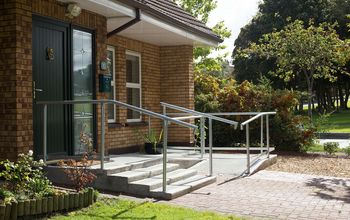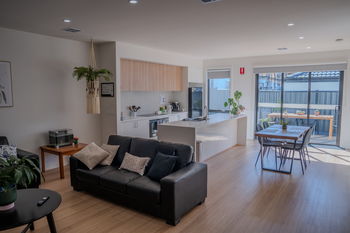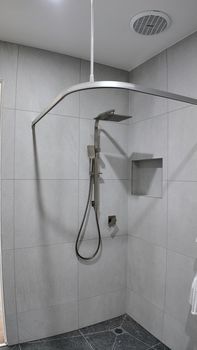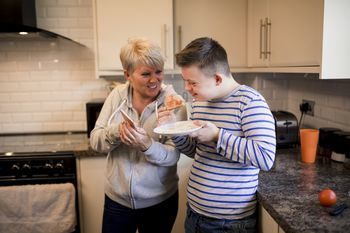Specialist Disability Accommodation
Find Your Forever Home
What is Specialist Disability Accommodation (SDA)?
Specialist Disability Accommodation (SDA) is a type of NDIS funded housing designed for people living with extreme functional impairment or very high support needs. These purpose built homes offer enhanced accessibility and safety features to help participants live more independently.
SDA is more than just housing — it’s about empowering eligible NDIS participants to live with greater freedom, dignity and control. The level of SDA funding a participant receives is determined by the NDIA based on assessments from an Occupational Therapist and the participant's individual support needs.
What Types of SDA Homes Can You Access?
At Melbourne Disability Services, we offer a range of SDA housing options to suit different lifestyles and support requirements:
- Apartments – Private, self-contained units within a larger building
- Duplexes / Villas / Townhouses – Semi-attached homes with shared walls
- Houses – Standalone properties with private gardens or courtyards
- Group Homes – Shared accommodation for 4–5 residents with round the clock support
All of our SDA properties are designed with comfort, accessibility, and community integration in mind.
SDA Accessibility Categories
Each SDA home is built to meet one or more of the following NDIS recognised accessibility categories:
Improved Liveability
Designed for people with sensory, cognitive, or intellectual impairments, featuring safer layouts, lighting and visual contrasts.
Fully Accessible
Equipped with extensive physical accessibility features such as wide doorways, step-free entry and reinforced handrails.
Robust Housing
Built with durable, impact resistant materials for individuals with complex behaviours that may involve damage to property.
High Physical Support
Provides advanced infrastructure including ceiling hoists, assistive tech, backup power, and automation systems to support high physical needs.
Who Can Access Our SDA Homes?
SDA housing is available to NDIS participants aged 18+ who meet the following criteria:
- Have a permanent disability with high or very high support needs
- Have an active NDIS plan with SDA funding approved
- Are seeking a home built to match their accessibility category and lifestyle
Many participants approved for SDA are also funded for Supported Independent Living (SIL) to receive 24/7 care services while living in their accommodation.
If you already have SDA funding in your plan, or are in the process of applying, our team can guide you through the next steps.
Interested in one of our properties?
Get in touch today to express your interest or schedule a property tour. Call us on 03 8351 9901 or simply fill out the enquiry form below and one of our friendly team members will contact you to discuss your needs.
View our SDA Vacancies Contact Us
Frequently Asked Questions
| 1. What is NDIS SDA? | NDIS SDA (Specialist Disability Accommodation) is housing designed for people with high or complex support needs who are eligible under the NDIS. These homes offer specialised designs to cater to individuals with disabilities, providing tailored features such as wider doors, accessible bathrooms, and additional safety features. SDA aims to help participants live as independently as possible, ensuring comfort and ease in daily living. |
| 2. Who is eligible for NDIS SDA? | Eligibility for NDIS SDA is determined by a person’s disability-related needs and goals. To qualify, an individual must meet specific criteria within the NDIS, including having a permanent and significant disability that requires high-level supports. The NDIS planner will assess a participant’s needs to determine if SDA funding is appropriate based on their ability to live independently and the level of support required. |
| 3. What are the different types of NDIS SDA? | There are three main types of NDIS SDA housing:
|
| 4. What is the funding process for NDIS SDA? | NDIS SDA funding is included in a participant’s NDIS plan. The funding is used to pay for the cost of the accommodation, including rent and any necessary modifications to the home. To receive SDA funding, participants need to demonstrate the need for specialised housing through their NDIS plan. This involves providing detailed information about their disability and living requirements during the planning meeting. |
| 5. How do I apply for NDIS SDA funding? | To apply for NDIS SDA funding, you must first be an NDIS participant and have a current plan. During the planning process, you will need to explain your disability and how it impacts your daily living. Your planner will assess whether SDA is suitable for you. You may need to provide supporting documentation from medical professionals or other specialists to demonstrate your need for specialist accommodation. |
| 6. Can I choose my NDIS SDA provider? | Yes, participants can choose their preferred SDA provider based on the housing options available. There are many SDA housing providers offering a range of properties that suit different needs and preferences. It’s important to assess the available options, including the type of housing, location, and features that best meet your individual requirements. |
| 7. What are the costs associated with NDIS SDA? | NDIS SDA funding covers the costs of the accommodation itself, which includes rent and maintenance. However, participants are still responsible for other living expenses, such as utilities (electricity, water), food, and personal care, which are not covered by SDA funding. The NDIS funding is designed to help with the cost of specialized housing, but participants may still need to contribute to daily living expenses. |
| 8. Can NDIS SDA be used for shared accommodation? | Yes, NDIS SDA can be used for shared accommodation. Many SDA providers offer shared housing options, where multiple participants live together and share the costs of the accommodation. This can be a good choice for individuals who prefer to live with others while receiving the necessary support. The NDIS allows flexibility in choosing either shared or individual accommodation depending on personal preferences and support needs. |
| 9. What features are included in NDIS SDA homes? | NDIS SDA homes are designed to include features that make living easier for people with disabilities. These features may include:
These features vary depending on the type of SDA (e.g., Improved Liveability, Fully Accessible, High Physical Support). |
| 10. How do I find NDIS SDA accommodation near me? | Finding NDIS SDA accommodation involves searching for available providers in your area. You can begin by browsing the NDIS website or contacting local housing providers who specialise in SDA homes. There are also online platforms and services that list SDA properties, where you can filter options based on location, features, and accommodation type. It’s advisable to visit potential homes and assess their suitability for your needs before making a decision. |
| 11. Can I live independently in NDIS SDA homes? | Yes, one of the main goals of NDIS SDA is to enable individuals to live as independently as possible. SDA homes are designed with accessibility and independence in mind, offering features and equipment that support individuals to manage daily activities with less assistance. The level of independence you have will depend on your individual needs and the type of SDA you are living in, but most SDA accommodations promote autonomy and independence. |
| 12. Can family members live with me in NDIS SDA? | Family members can live with you in an NDIS SDA home, provided the home has space and the arrangement meets your individual needs. However, the NDIS funding covers only the costs related to your accommodation, and family members may need to cover their own living expenses. It’s important to discuss this with your NDIS planner to ensure your housing needs and preferences are appropriately accounted for. |
| 13. How long does it take to get NDIS SDA? | The process of getting NDIS SDA accommodation can take several months. The application for SDA funding depends on your individual plan review and whether your needs qualify for specialized accommodation. Once approved, finding a suitable home can take additional time, as availability may vary. It’s essential to start the process early and communicate with your NDIS planner and housing providers to expedite the timeline. |





